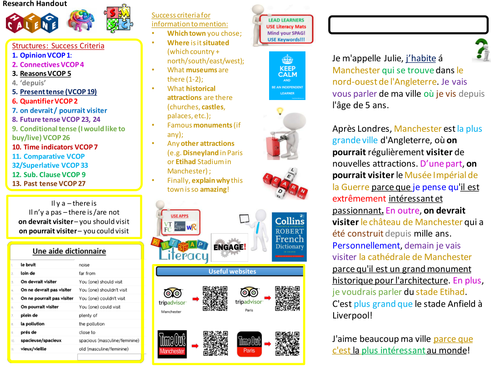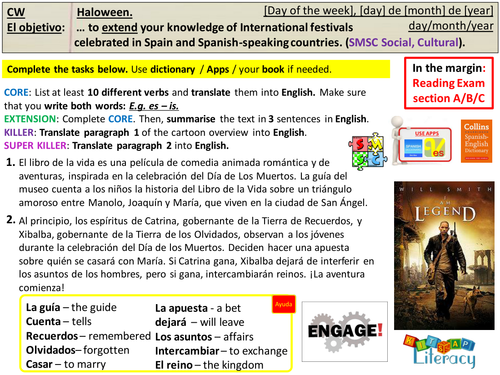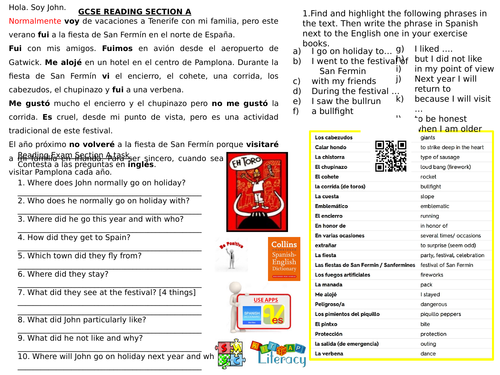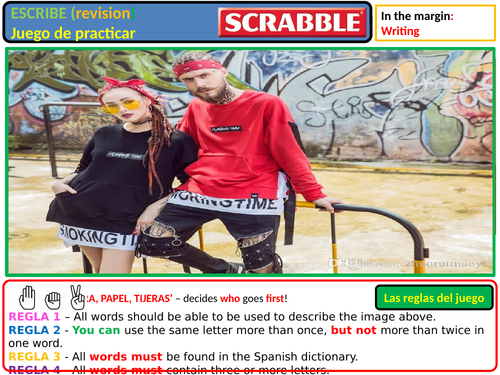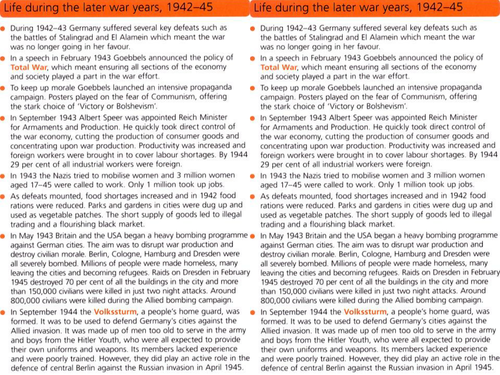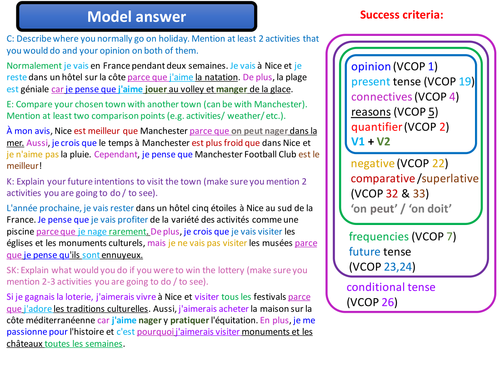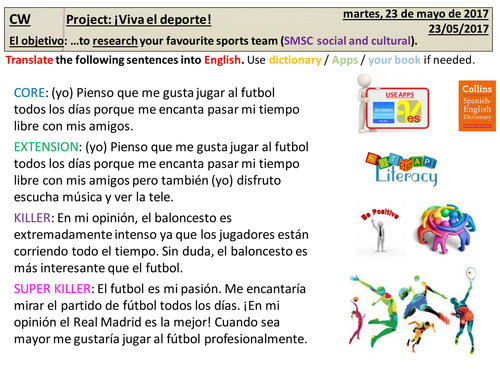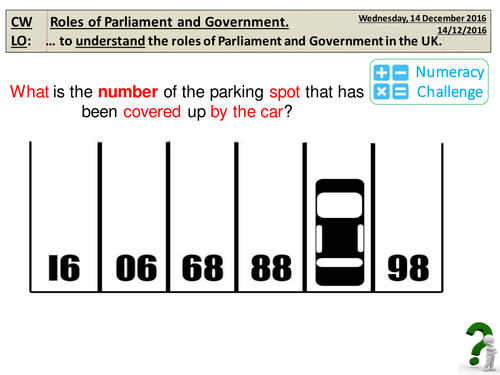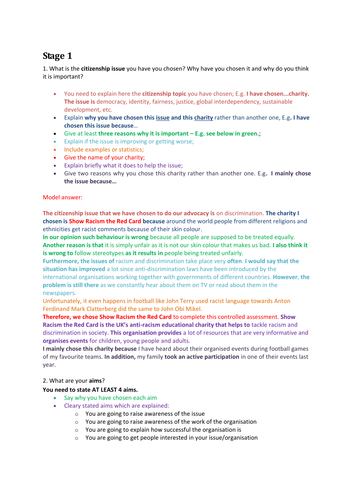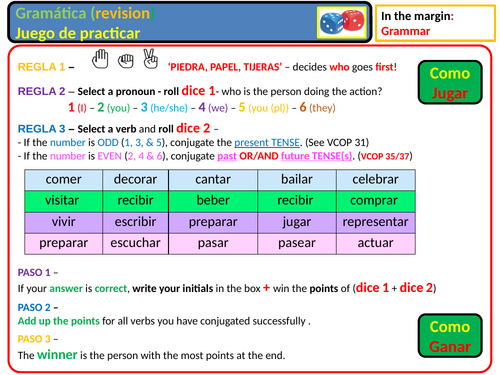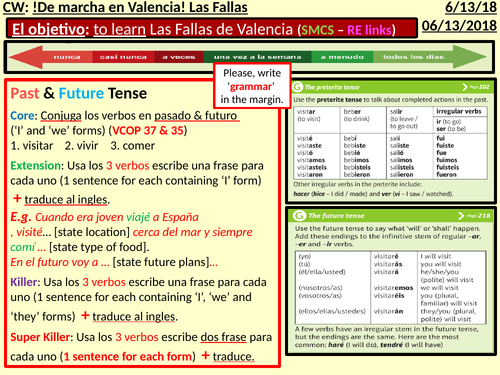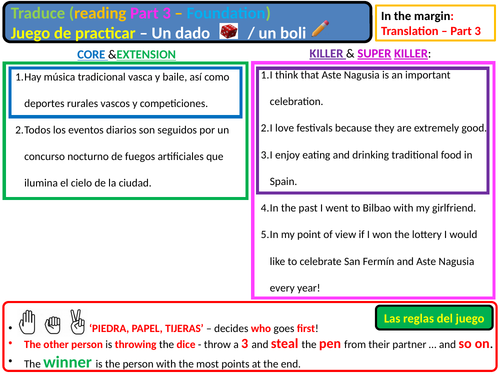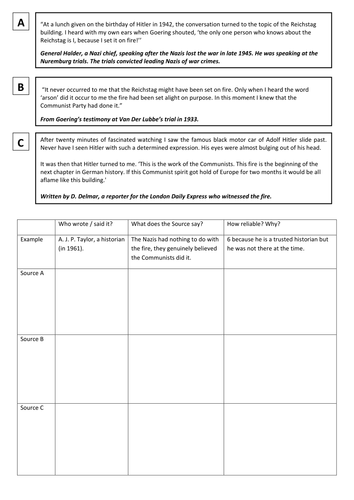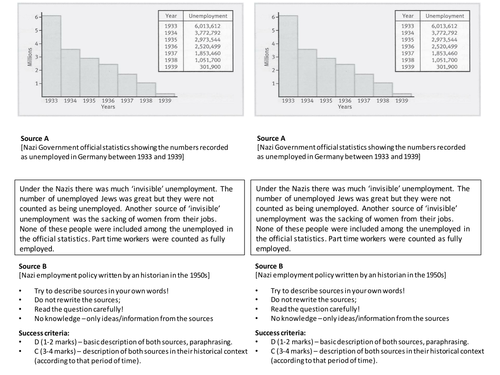
121Uploads
34k+Views
5k+Downloads
All resources

Town research project for KS3/KS4 French - Ma ville préférée
This is a research project lesson (or two lessons really) that I created for my year 8 French students. It can also be used for year 9 as the model answer has quite a list of grammar / some more can be added. The idea is to promote independent learning via research. There are two choices: a documentary about your favourite town in England (in my case it is Manchester) or an interview with a football player about his town in France( I chose Paris). Students decide on the task, the roles and start researching relevant information using their iPads (one of the students needs to summarise the information that others found). They then have to prepare a script in French and to make a video using iMovie or any other video application. If there is little time I would suggest them to present it and I would film it. The whole process takes about 2 lessons and is perfect for the end of the topic as you can incorporate all of the structures / vocabulary learned during the term!

Town research project for KS3/KS4 Spanish - Mi ciudad favorita
This is a research project lesson (or two lessons really) that I created for my year 8 Spanish students. It can also be used for year 9 as the model answer has quite a list of grammar / some more can be added. The idea is to promote independent learning via research. There are two choices: a documentary about your favourite town in England (in my case it is Manchester) or an interview with a football player about his town in Spain ( I chose Madrid). Students decide on the task, the roles and start researching relevant information using their iPads (one of the students needs to summarise the information that others found). They then have to prepare a script in Spanish and to make a video using iMovie or any other video application. If there is little time I would suggest them to present it and I would film it. The whole process takes about 2 lessons and is perfect for the end of the topic as you can incorporate all of the structures / vocabulary learned during the term!

KS4 Spanish Halloween El Dia de los Muertos (AQA GCSE)
This is a lesson which I prepared for my KS4 Spanish groups for the end of the term. It includes one of my favourite starters - students have to analyse the overview of the cartoon - The Book of Life - and choose a task according to their level. You would then check the answers and would move on to explaining the lesson outcomes. Then they would have some fun with a tongue twister, working on their pronunciation of ‘Br’ sound (one of their favourite thing to do every lesson - easy to find and to tick SMSC, engagement, phonics and oracy points).Then I have included a mind map mini-plenary for them to revise the festivities/celebrations vocabulary. It is then followed by the new vocabulary introduction with a quizlet and quizlet live games. A short Rally coach activity is included for them to consolidate the vocabulary and to practice translating topic-related sentences. I have then arranged for a listening / reading activity using one of the youtube videos of the SpanishPod101 about Halloween. The lady speaks fast but there are Spanish and English subtitles at the bottom to assist students with understanding the video. They would answer the listening questions as they listen to /watch the video. The next task is Reading (Section B) - they need to insert the correct words in the text about the Day of the Dead followed by the AQA skill-based self-assessment. Finally, the ‘words’ snake’ plenary that students totally love - they have to work in groups remembering topi-specific vocabulary. Enjoy!

Spanish Festivals: San Fermin - Spanish KS4 AQA Reading A
This is the lesson that I have prepared for my y9/y10 in relation to the topic of Spanish culture (Festivals & Celebrations). The lesson starts with the starter about food (it was previous topic and I always try to link things together) and following review of lesson outcomes we move onto to trying to recite a tongue twister (plus a cultural SMSC tip!). Students will then recap on regular verbs conjugation in present tense and learn new / revise already known vocabulary on the topic of San Fermin celebration using Quizlet and Quizlet live tools. I have then included a video (see link) of Rosa from SpanishPod101 (see their channel in youtube) describing the celebration of San Fermin. Even though the video is in Spanish and Rosa speaks really quickly, there are subtitles in English so that all students have a chance to listen to a native speaker and at the same time understand what the video is about (note: I personally find the Spanishpod101 videos amazing as they address quite a few cultural / grammar / pronunciation and other aspects so I would recommend letting your students know that a lot of resources are available for free. Consequently, students answer quiz questions about the video and move on to Reading activity. They read the text aloud, search for cognates and keywords and finally answer the questions that I have tried to create in the style of AQA Higher Reading Section A. Please note that there is also a handout to make the task easier and faster to access. Enjoy!

AQA GCSE Photo card scrabble / Tarsia games with templates (speaking / writing /revision)
These are two grammar games that I decided to share. I would use them for pretty much all age groups, both KS3 and KS4, GCSE both tiers. They can be easily amended to suit the grammar topics that you wish to reinforce / revise / introduce. The templates can also be easily reused for French.
See enclosed:
Photo card scrabble (related to AQA GCSE speaking / writing tasks). I originally thought of this as a game prior to completing an exam task for KS4 students. The pack includes a slide and a scrabble board if you wish to organise an extended activity. Students need to come up with words related to the image, the words should contain 3 or more letters and they should be in Spanish!
Tarsia slide and template - an activity to use to revise topic / key vocabulary. Students can either create their own or just cut the one you prepare for them. They need to then match the words / expressions in English with their Spanish equivalents.
Let me know how it goes!

Nazi Treatment of Jews during WWII (Later years)
These lessons are about Nazi Treatment of Jews during WWII (Later years). The slides include a set of my standard activities, such as settler, starter (exam question with success criteria, model answer, explanation on how to assess the answer, peer/self assessment, SPAG control slides), information research task (see appropriate handout) and some fun activities for revision of information.
You can also find this lesson in a pack of lessons about the treatment of Jews through the whole WWII.

Research project (Motivational triggers) for KS3 French - Bon voyage (Holidays) (AQA new spec)
This is a research project lesson (or two lessons really) that I created for my year 7 French students. The writing example can be easily adapted if more structures are to be added. The idea is to promote independent learning via research. Students have to research information about the place that they would like to visit (any place in world really but I encouraged to visit France). Students decide on the task and start researching relevant information about the chosen location using their iPads/ Chromebooks. At the same time they create a poster or a travel brochure with pop-up images (!!!) about the chosen location. During the second lesson they distribute the writing task bullet points in-between the members of the group and complete a piece of writing as per success criteria and model answer. In the end they stick their written notes (or attach them) to their poster /travel brochure. The whole process takes about 2 lessons and is perfect for the end of the topic as you can incorporate all of the structures / vocabulary learned during the term! Note: the writing example is oriented on the revision of tenses studied this year, holidays, weather and location vocabulary. Please let me know if you have any other ideas on how this project can be implemented. If you still have some time left you can enjoy few games I have inserted to simply have fun during the (possibly) last lesson of the year.

Research project (Motivational triggers) for KS3 Spanish - Viva el deporte!
This is a research project lesson (or two lessons really) that I created for my year 7 Spanish students. See similar post for early GCSE classes. The writing example can be easily adapted if more structures are to be added. The idea is to promote independent learning via research.Students have to research information about a sports team and create a poster. After that they have to produce a piece of writing to express their opinion on that team. Students decide on the task, the roles and start researching relevant information using their iPads (one of the students needs to summarise the information that others found). The whole process takes about 2 lessons and is perfect for the end of the topic as you can incorporate all of the structures / vocabulary learned during the term!

My studies - Spanish - AQA GCSE new spec Part 3 HT - Conversation - Speaking frame + Model answer
This is the speaking framework and the model answer that I wrote for the early GCSE classes. The model answer and the framework were originally designed for them to write an essay that they might use for the speaking test or keep it in file to revise prior to the exam. I have also used it as a writing model answer.
There are three documents in there because I was trying to check what works better and in the end decided that the framework is quite sufficient for them to realise what are they expected to write / say.
I have left references to the VCOP mat in case someone wants to put their numbers in, alternatively, just delete them as I left the names of the structures.

5. Roles of Parliament and Government
This lesson was prepared for the year 11 Citizenship students (AQA full course). This lesson is on the topic of Roles of Parliament and Government. It includes settler, starter, learning objectives/keywords introduction slide, a keywords quiz, some key information and call for discussion on the roles of the governing system in UK (Parliament-Monarch), a short quiz to check the understanding of information presented, some information and Round Robin activity on the Government in UK, Keywords Challenge slide (to revise the keywords!), and some exam practice on the questions of the Part B (4 a and 4 b) with success criteria, model answers and self-assessment. The presentation ends with a cartoon for a plenary discussion.

AQA Citizenship Controlled Assessment Stage 2 templates
These are the templates that I used as examples for controlled assessments for the Citizenship studies (AQA). The vast majority I have written myself with some help from the past work of students. I have tried to highlight the important points to mention and to show how it should look like.

Spanish Verb conjugation games (AQA GCSE/KS3)
This is a collection of verb conjugation games that I decided to share. I would use them for pretty much all age groups, both KS3 and KS4, GCSE both tiers. They can be easily amended to suit the grammar topics that you wish to reinforce / revise / introduce. The templates can also be easily reused for French.
See enclosed:
Snakes and ladders slide (you can amend the squares and it is short enough to serve as a 5-10 minutes activity;
The dice game to revise verbs conjugations (differentiated). I included a slide with rules of the game, a template to create your own and an origami instructions to make it more hands on.
Dice conjugation (differentiated) - I would mostly suggest it for KS4 students as it is easier to differentiate. Students have a board with verbs and they need to roll dices to ascertain the personal pronoun that they apply to the infinitive on the board. My students totally loved it!
Let me know how it goes!

AQA GCSE Spanish - SMSC/Cultural- Las Hogueras de San Juan Listening A + writing FQ1/ HQ4
This is the lesson that I have prepared for my higher y8/ and y9/y10 in relation to the topic of Spanish culture (Festivals & Celebrations).
The starter is based on the review of the cartoon called ‘The Book of Life’ (El Libro de la Vida). Students read the review and complete various tasks according to their ability. Then they check their answers, review the lesson objectives and have fun resiting a tongue twister (I personally believe phonics is the way forward for the students of all ages). Students will then learn new / revise already known vocabulary on the topic of Las Hogueras de San Juan festival using Quizlet and Quizlet live tools. I have then included a video (see link) of Rosa from SpanishPod101 (see their channel in youtube) describing the festival.
Even though the video is in Spanish and Rosa speaks really quickly, there are subtitles in English so that all students have a chance to listen to a native speaker and at the same time understand what the video is about (note: I personally find the Spanishpod101 videos amazing as they address quite a few cultural / grammar / pronunciation and other aspects so I would recommend letting your students know that a lot of resources are available for free. Consequently, students answer quiz questions about the video. I presented it as a Listening task.
Then they move on to Writing Foundation Questions 2 and 4 // Higher Tier Question 1. Students begin by translating the short text into English and coaching each other if stuck at the same time assessing each others work. Then they revise some grammar by playing tarsia game (see template in the end of the presentation).
Consequently they get on with reading the question and what is required from them and discussing the what they could include in their answer (both content and grammar structures). Then they make a break and play a dice game (can be prepared prior to the lesson or during the same - see template in the end of the presentation) and a learning grid to revise verb tenses. They then get back to the task and work in pairs to plan their answers. Finally they complete the task individually, discuss the success criteria and the marking scheme with the teacher and peer / self assess their work.
And, as a reward they play Hangman! (I have posted this slide for free within my resources - search for ‘El ahorcado’).
Please let me know if there are any problems / ideas!

KS3 KS4 Spanish - SKILLS - How to use a dictionary effectively / Aste Nagusia
This is the resource that I have prepared for both GCSE and KS3 classes. It can be used as a template as the only thing you would change is the text and the words. I believe the full set of slides needs to be used several times until a group of students remember the sequence of actions. The only thing left is to continue revisiting to gain confidence in using the dictionary!
The text that I chose to introduce this task is based upon short cultural texts on the topics of a Basque festival, Aste Nagusia, and Las Hogueras de San Juan. Students look through the first text and analyse the explanation of different things one can find next to the Spanish word in a dictionary. Then they compete (a game!=team challenge) to translate the words.
Then they work in teams to figure out how to use the bi-lingual dictionary effectively - they analyse simple words used in classroom language and try to find their meaning in Spanish at the same time not forgetting to pay attention to gender of the nouns and adjectival agreement (extension - they think of more examples of words they could use). For KS4 students you might add another level of difficulty - include verbs in English in different tenses and let them decide how to correctly translate these verbs in Spanish.
Finally they have a look at the second text and try translating it themselves into English (or given words / very simple text if KS3)
The most important thing in my point of view is to remember that translating is an art not a precise science!
NOTE: I used a dictionary cut outs from the internet which is most likely an extract from Collins Eng-Sp and Sp-Eng dictionary.

GCSE Spanish - SMSC / Cultural - Las Fallas - Listening/ Photo Card/ Reading C (AQA)
This is the lesson that I have prepared for my higher y8/ and y9/y10 in relation to the topic of Spanish culture (Festivals & Celebrations). The starter focus is the Past Simple (preterite) and the Future SImple (‘will’). We use Viva books so I included help boxes as a reminder for those who do not clearly remember the endings. Students will then look at the speaking questions of the half-term, analysing them and trying to come up with a set of ideas for a response. I have then included a video (see link) of Rosa from SpanishPod101 (see their channel in youtube) describing the celebration of Las Fallas.
Even though the video is in Spanish and Rosa speaks really quickly, there are subtitles in English so that all students have a chance to listen to a native speaker and at the same time understand what the video is about (note: I personally find the Spanishpod101 videos amazing as they address quite a few cultural / grammar / pronunciation and other aspects so I would recommend letting your students know that a lot of resources are available for free. Consequently, students answer quiz questions about the video. I presented it as a Listening task. They annotated the questions and complete the task using vocabulary help.
Students will then learn new / revise already known vocabulary on the topic of Las Fallas festival using Quizlet and Quizlet live tools. Then they recap on the success criteria for Speaking Q2 / Writing Q1 - Photo card and complete a photo card task based on a photo from La Tomatina celebration together. They jot their thoughts first, play a catchphrase game and then prepare their responses in pairs on the second photo card. Finally they complete a third photo card task individually.
Finally they read and analyse the grammar in the text about festival to complete AQA Higher Reading Section C task (translation). I included some grammar tips for them and highlighted them in the text to make it easier. Then they complete the task, check their answers, self assess themselves and play Hangman (as a reward for hard work!). Enjoy!

AQA GCSE Spanish Games Conjugation Learning Grid and Cube// El Bingo (grammar/vocabulary/ revision)
These are few grammar games that I decided to share. I would use them for pretty much all age groups, both KS3 and KS4, GCSE both tiers. They can be easily amended to suit the grammar topics that you wish to reinforce / revise / introduce. The templates can also be easily reused for French.
See enclosed:
Verb conjugation Learning Grid (differentiated) - Students roll two dices to identify the tense and the pronoun they need to use. To make the task more complicated for more advanced students I ask them to create a sentence using the verb they got with particular amount of words to further challenge higher tier students. I would highly recommend it for the KS4 students.
El Bingo (good to promote Vocabulary / Listening / Phonics). Teacher gives studnets 15 words and asks them to write 5 of them down. Teacher then either says the translation of the words on the board (KS3) or defines them in Spanish / English (y9/10/11). If students recognise one of their words they cross it out, first one who crosses 5 wins!
Conjugation Cube. Students create a set of two dices that they will roll together. There are two versions of them to provide for two levels of differentiation. Students play in turns to conjugate the verbs! I included an origami version of the cube in case you wish to ask them to make the cube and to write the questions on their own (I took the scheme from the Google images so I do not claim any rights on that one.)
Let me know how it goes!
Bundle

AQA GCSE Spanish - Writing (Foundation) answer strategy
These are the templates that I prepared for my higher year 8 Spanish students and early KS4 in relation to answering Writing Foundation Questions 1-4. They include different games and tasks to revise verbs conjugations and vocabulary to answer the questions.
I also included the templates for some games and activities. These templates are totally amendable and adaptable to use with different topics and so far worked for my students.
Please let me know how it goes!

Spanish Translation game (AQA GCSE Reading Part C / Writing Section 3)
One of my KS4 students favourite games!
One dice, one pen (un dado, un boli) - (differentiated, AQA Reading Section C / Writing Part 3 Higher / Foundation) - Students roll dice in turns to translate the sentence correctly! If the partner throws 3 he takes over a pen. The winner is the one who collected the most points. I used it with KS4 to facilitate the exam translation tasks.
I also included a set of slides that I used to emphasize certain grammar points.
Let me know how it goes!

The Reichstag Fire Worksheet
This is the worksheet that I featured in one of the lessons. It contains three sources which students have to use to complete the table (COP).

Fuhrer's success: Fighting Unemployment / was Hitler successful?
This lesson is about the success of Fuhrer in Fighting unemployment. The first slide is the handout that should make it easier to complete the starter question (exam practice). You also have a usual settler, Create a quiz quiz trade (students write down a question and an answer from the recently learned topic and go around the classroom asking each other those questions - check Kagan education technique website for further description), a recap from the last lesson (the same activity really - as in my previous lesson - Was Hitler successful in fighting Depression). And, again, peer-assessment as a plenary. Enjoy!

